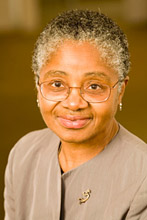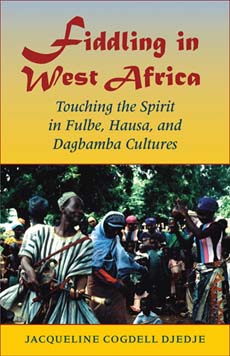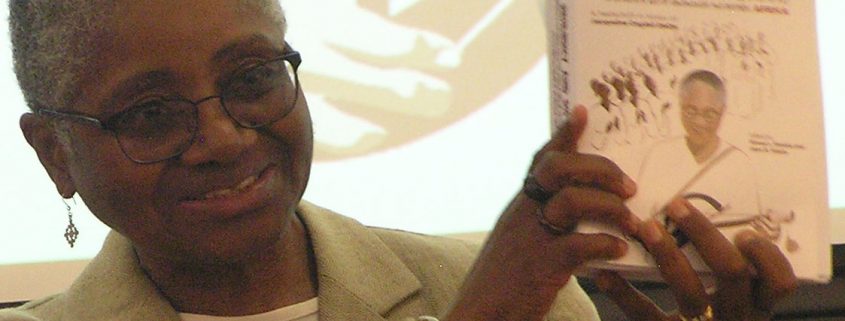Center Talk! Jacqueline Cogdell DjeDje Retires
 After thirty-four years on the UCLA faculty, Dr. Jacqueline Cogdell DjeDje, professor and former chair of the Ethnomusicology Department at the UCLA Herb Alpert School of Music, retired in June. Dr. DjeDje, who received her BA from Fisk University, and her doctorate and master’s degrees from UCLA’s Music Department (with a specialization in ethnomusicology), joined UCLA’s faculty in 1979. She has conducted research throughout West Africa and the United States. Dr. DjeDje is author of the 2008 book, Fiddling in West Africa: Touching the Spirit in Fulbe, Hausa, and Dagbamba Cultures, which won several awards: the 2009 Society for
After thirty-four years on the UCLA faculty, Dr. Jacqueline Cogdell DjeDje, professor and former chair of the Ethnomusicology Department at the UCLA Herb Alpert School of Music, retired in June. Dr. DjeDje, who received her BA from Fisk University, and her doctorate and master’s degrees from UCLA’s Music Department (with a specialization in ethnomusicology), joined UCLA’s faculty in 1979. She has conducted research throughout West Africa and the United States. Dr. DjeDje is author of the 2008 book, Fiddling in West Africa: Touching the Spirit in Fulbe, Hausa, and Dagbamba Cultures, which won several awards: the 2009 Society for Ethnomusicology’s Alan Merriam Prize, given to “the most distinguished published English-language monograph in the field of ethnomusicology,” and the 2010 Kwabena Nketia Book Prize (the inaugural award) from the Society for Ethnomusicology African Music Section for “the most distinguished book published on African music.” Other books include Distribution of the One String Fiddle in West Africa, American Black Spiritual and Gospel Songs from Southeast Georgia: A Comparative Study, Black Religious Music from Southeast Georgia (a recording with accompanying booklet), and California Soul: Music of African Americans in the West (co-edited with Eddie S. Meadows). In addition to her many honors, Dr. DjeDje is the recipient of two awards from the National Endowment for the Humanities. Dr. DjeDje took time recently to speak with us about how her social activism helped launch her academic career, her research, ethnomusicology, and her thoughts about retirement.
Ethnomusicology’s Alan Merriam Prize, given to “the most distinguished published English-language monograph in the field of ethnomusicology,” and the 2010 Kwabena Nketia Book Prize (the inaugural award) from the Society for Ethnomusicology African Music Section for “the most distinguished book published on African music.” Other books include Distribution of the One String Fiddle in West Africa, American Black Spiritual and Gospel Songs from Southeast Georgia: A Comparative Study, Black Religious Music from Southeast Georgia (a recording with accompanying booklet), and California Soul: Music of African Americans in the West (co-edited with Eddie S. Meadows). In addition to her many honors, Dr. DjeDje is the recipient of two awards from the National Endowment for the Humanities. Dr. DjeDje took time recently to speak with us about how her social activism helped launch her academic career, her research, ethnomusicology, and her thoughts about retirement.
Ed. How did you get into music?
JCD. I wanted to be a concert pianist and perform Western classical music. When I was a youngster growing up in the South, we were taught that Western music was better or more advanced than music of other cultures. I played other music (for example, African American hymns, spirituals, and gospels) in church, but I didn’t respect it probably because it was not taught in school. I went to Fisk University (a historically black university in Nashville, Tennessee) to become a concert pianist. Even though Fisk was founded in 1866 as an all-black school, very little about African or African-American culture was included in the music curriculum. Like everywhere else at the time, Fisk had a Western music curriculum that was no different from what one would find in a historically white university.
Ed. How did you discover ethnomusicology?
JCD. Well, no one at the age of five says, “I want to be an ethnomusicologist!” I didn’t learn about it until I was a junior at Fisk.
Ed. What happened at Fisk?
JCD. When I was there, this was the time of the Civil Rights period. Stokely Carmichael was the leader of SNCC (Student Nonviolent Coordinating Committee), and he visited Fisk during my freshman year. That changed everything! I’m a child of the 60s. So we were not afraid to protest. And as a result of him coming to Fisk, many of us began agitating for changes in the curriculum; we wanted to see something relevant to us.
Then in my junior year, Fisk invited Darius Thieme to teach courses related to African music. He was an ethnomusicologist who had conducted research in Nigeria. He taught a course one semester on African music, then a course on music of the African diaspora another semester. He organized a festival and invited this female scholar [Pearl Williams-Jones, an ethnomusicologist who was a pioneer in research on gospel music] to make a presentation. In addition to singing, she talked about gospel music and African music in a way I’d never heard before. It was so special to see African music taught within the context of the university because it gave the music a certain legitimacy that I hadn’t experienced before. I asked, “Can you do this professionally?” Thieme said, “Yes, as an ethnomusicologist.” And he directed me to UCLA, because they had the major program for ethnomusicologists at the time.
Ed. What is the importance of ethnomusicology?
JCD. Ethnomusicology is the study of music in culture. It allows us look at how people live, think, and what they do, through the prism of the music. We can use music as a barometer for what’s going on in society.
Ed. Much of your research has been about fiddling. Why were you drawn to it?
JCD. I was first introduced to African fiddling when I took a course in African music at UCLA. Because it was a musical tradition I did not associate with the African continent or Black people, I decided to write my dissertation on fiddling in West Africa. Later, I became involved with the violin because of my daughter. She started taking violin lessons with the Suzuki method at about age five or six. So that’s how I became interested in the violin.*
*In a December 2009 interview for Music @UCLA, Dr. DjeDje gave additional detail about the history of the violin, which is included below:
“Noteworthy is the fact that playing the violin was something that she [my daughter] wanted to do but her friends questioned why she wanted to learn the violin, because her father is from West Africa. “Why aren’t you learning drumming,” they asked. “Why aren’t you dancing, or doing this” – the stereotype of following in the tradition of her father, and asking why she was studying this Western European instrument. And I said, “Wait a minute now – the violin is not only Western, it’s African; it’s global.” And I’d done all this research on the West African violin. That’s when I said, “Why don’t I make my research on the violin more available to the world?” I wanted to do a cross-cultural study, looking at the African violin as well as the role of the instrument among African Americans here in North America. It dates all the way back to the 17th century.
Interestingly, Africans were most often the people who played the violin here in North America during the slave era. Whites didn’t always play the violin, because they saw it as work, and it was the Africans who did the work while the whites were there for the entertainment. Some Europeans taught their slaves violin, and Africans performed at balls or informal settings for them. So the violin was probably the most dominant instrument in African-American culture, up until the early 20th century. During slavery, it was more popular than the banjo, which actually came from Africa. So, with all this history, it was important for my daughter to feel comfortable – to have legitimacy in the eyes of her peers. She could say, “This is not necessarily Western. I am following my heritage by studying the violin.’”
Ed. How do you think technology has affected the way people experience music?
JCD. Now, people tend to experience music mostly through technology as opposed to being directly musically involved and engaged with it. The younger generation experiences music through radio and iPods, they don’t have as much direct contact with the music – playing instruments, attending live concerts, etc. What does that mean for our society? People are nourished by music in the same way they are nourished by food. But you want to make sure you eat some fruits and vegetables instead of consuming Cheetos all the time!
Ed. What do you think is left to learn about the field?
JCD. There’s so much to be done! My first love is Africa. We know so little about the continent. Once you conduct a study there, you continue to go back. There is so much African research still to be done – with traditional music vs. new music, as well as looking at music in the cities vs. music in small towns.
Ed. What plans do you have for retirement?
JCD. I have several music research projects that I want to bring to closure. Then I may want to pursue some non-music activities.
Ed. What will you miss the most when you retire?
JCD. I’ll miss the students most. I’ll miss the faculty meetings the least (laughs). I received a festschrift (a collection of essays written in celebration of the life and contributions of the person they are honoring) from my former students for my retirement. They’d been planning the festschrift for three or more years. I was surprised they got together to honor me in this way. Since my courses tend to be rigorous and I have high expectations, students say that I’m hard. My mentors challenged me, so that kind of work ethic is who I am and what I expect from them. [I thought] Some students didn’t feel comfortable being challenged. But after receiving the festschrift, I now know how much they appreciated what I was trying to do, how valuable the work ethic was to them in completing their studies and establishing their careers.




